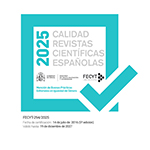Time, Knowledge and Heterotopia: Garden-aesthetics in J.W. Goethe’s Novel Die Wahlverwandtschaften
Abstract
Goethe’s novel Die Wahlverwandtschaften, published in 1809, is also a way of articulating knowledge around an anecdotal event, so that it may reach a symbolic nature. The centre around which anecdote and knowledge turn – that is the plot of the novel – is the garden around the castle of the baron Eduard.
This knowledge is filed, collected, planed, reorientated and put into practice in the novel. All these actions, whose common direct object is the garden – understood as knowledge –, involve a way of formulating and presenting time. That is the reason why I conceive the relation between time and garden as the main matter of this article. A subject I will discuss regarding it from two different points of view: the first, philosophical, the second, from the field of Poetics. All of this will lead to the conclusion that the aesthetic – in an etymological sense – way of understanding the garden in the novel results form the combination of some crucial elements that turn it into a heterotopia.
Downloads
Article download
License
In order to support the global exchange of knowledge, the journal Revista de Filología Alemana is allowing unrestricted access to its content as from its publication in this electronic edition, and as such it is an open-access journal. The originals published in this journal are the property of the Complutense University of Madrid and any reproduction thereof in full or in part must cite the source. All content is distributed under a Creative Commons Attribution 4.0 use and distribution licence (CC BY 4.0). This circumstance must be expressly stated in these terms where necessary. You can view the summary and the complete legal text of the licence.










